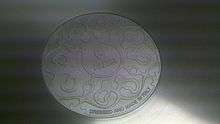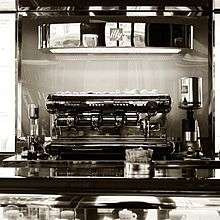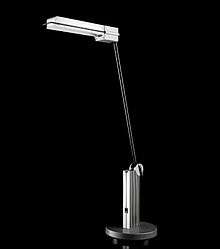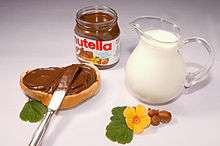Made in Italy
Made in Italy is a merchandise mark indicating that a product is all planned, manufactured and packed in Italy,[1] especially concerning the design, fashion, food, manufacturing, craftsmanship, and engineering industries.
History

Made in Italy brand has been used since 1980 to indicate the international uniqueness of Italy in four traditional industries: fashion, food, furniture and mechanical engineering (automobiles, industrial design, machineries and shipbuilding), in Italian also known as "Four A", Abbigliamento (clothes), Agroalimentare (food), Arredamento (furniture) and Automobili (automobiles). Italian products have often been associated with quality, high specialization and differentiation, elegance, and strong links to experienced and famous Italian industrial districts often connected with the concept of luxury.[2] Since 1999, Made in Italy has begun to be protected by associations such as Istituto per la Tutela dei Produttori Italiani (Institute for the Protection of the Italian Manufacturers) and regulated by the Gucci company to the Italian government.[3][4]
In recent times the merchandise mark Made in Italy has become decisive for Italian exports and so common worldwide to be often considered as a separate product category. In January 2014, Google Cultural Institute, in collaboration with the Italian government and the Italian Chamber of Commerce, launched an online project aimed to promote Made in Italy by using virtual showrooms about several famous Italian products.[5]
Regulation
In 2009, the Italian law (Law 135, September 25th, 2009 - Chamber of Deputies, Parliament of Italy) stated that only products totally made in Italy (planning, manufacturing and packaging) are allowed to use the labels Made in Italy, 100% Made in Italy, 100% Italia, tutto italiano in every language, with or without the flag of Italy. Each abuse is punished by the Italian law.[6]
Compared with "Made in Germany" ('all essential manufacturing steps') and "Made in the USA" ('all or virtually all'), Italian regulation is more restrictive ('totally') in determining what qualifies for the use of the "Made in Italy" label.[7]
Brands


.jpg)

Economists and business analysts have identified five companies in particular whose names are closely associated with Made in Italy:
- Barilla - food company;
- Benetton - global fashion brand;
- Ferrero - manufacturer of chocolate and other confectionery products;
- Indesit - home appliances;
- Luxottica - the world's largest eyewear company.[8]
Fashion
- Agnona[9]
- A.Caraceni
- Armani
- Alberto Fermani
- Bontoni
- Bottega Veneta
- Breil
- Brioni
- Brunello Cucinelli
- Buccellati
- Bulgari
- Calzedonia
- Canali
- Cerruti 1881
- Cesare Attolini
- Cesare Paciotti
- Corneliani
- Damiani
- Diesel
- Dolce & Gabbana
- E. Marinella
- Emilio Pucci
- Fendi
- Fiorucci
- Franklin & Marshall
- Gas Jeans
- Geox
- Gucci
- Harmont & Blaine
- Intimissimi
- Julie&Moth
- Kiton
- Le Village Sneakers
- Liverano & Liverano
- Loro Piana
- Marzotto
- Max Mara
- Missoni
- Miu Miu
- Moncler
- Moschino
- Officine Panerai
- Pal Zileri
- Persol
- Peg-Perego
- Piquadro
- Prada
- Rifle
- Roberto Botticelli
- Roberto Cavalli
- Rubinacci
- Safilo
- Salvatore Ferragamo
- Tod's
- Trussardi
- Valentino
- Versace
- Zegna
Food and beverage
- Acqua Minerale San Benedetto
- Amedei
- Auricchio
- Autogrill
- Averna
- Balocco
- Berlucchi
- Buitoni
- Caffarel
- Campari
- Carapelli
- Cirio
- Condorelli
- Coppola Foods
- De Cecco
- Divella
- Eataly
- Ferrari Trento
- F.lli Garcia
- Giovanni Rana
- Granarolo
- Illy
- La Molisana
- Lavazza
- Lazzaroni
- Loacker
- Martini & Rossi
- Massimo Zanetti
- Parmacotto
- Parmalat
- Perfetti Van Melle
- Perugina
- Saclà Italia
- San Carlo
- San Pellegrino
- Vicenzi
- Voiello
Furniture and home appliances
- Alessi
- Alivar
- Arketipo
- Artemide
- B&B Italia
- Bonaldo
- Brionvega
- Bticino
- Candy
- Casamania
- Casabath
- Cassina
- Cattelan Italia
- Cucine Lube
- De'Longhi
- Fiam
- Flos
- Flou
- Foppa Pedretti
- Foscarini
- Gallotti & Radice
- Gentry Home
- Indesit Company
- Jacuzzi
- Kartell
- Kristalia
- Lago
- Linea Italia
- Miniforms
- Moroso
- Natuzzi
- Pedrali
- Poltrona Frau
- Prandina
- Saba
- Scavolini
- Smeg
- Tacchini
- Tonelli
- Tonin Casa
- Zanussi
- Valdama
Engineering
- Abarth
- Alfa Romeo
- Aprilia
- Atala
- Axis Group Yacht Design
- Azimut Yachts
- Benelli Armi SpA
- Benelli
- Benetti
- Bertone
- Bianchi Bicycles
- Bravo
- Brembo
- Campagnolo
- Cantiere Navale Visentini
- Carpigiani
- Carraro Agritalia
- Carrozzeria Castagna
- Carrozzeria Ghia
- Carrozzeria Marazzi
- Carrozzeria Touring
- Cimbali
- Cipollini
- Colnago
- Custom Line
- Danieli
- De Rosa
- De Simon
- De Tomaso
- Dell'Orto
- Di Blasi Industriale
- Ducati
- Fabio Perini S.p.A.
- Ferrari
- Ferretti Group
- Fiat
- Filippi Boats
- Fioravanti
- Franco Tosi Meccanica (FTM)
- Ghia
- Giannini Automobili
- I.DE.A Institute
- Italdesign Giugiaro
- Leonardo
- Lamborghini
- Lancia
- Maire Tecnimont
- Maserati
- MER MEC
- Moto Guzzi
- MV Agusta
- Officine Meccaniche Giovanni Cerutti
- Permasteelisa
- PFM Group
- Pinarello
- Piaggio
- Pininfarina
- Pirelli
- Riva Yachts
- Silca S.p.A.
- Toscotec
- VM Motori
- Zagato
References
- Law 135, September 25th, 2009 camera.it
- Orizzonte Italia. orizzonteitalia.com
- Made in Italy. treccani.it
- Istituto per la Tutela dei Produttori Italiani. itipi.it
- Made in Italy, Google mette le eccellenze italiane in Rete. wired.it
- Made in Italy e lotta alla contraffazione leg16.camera.it
- Aichner, T. 2014. Country-of-origin marketing: A list of typical strategies with examples. Journal of Brand Management, 21(1): 81-93.
- "Archived copy" (PDF). Archived from the original (PDF) on 2014-03-24. Retrieved 2016-04-03.CS1 maint: archived copy as title (link) Il Made in Italy nel nuovo mondo, Protagonisti, Sfide, Azioni by Marco Fortis. Ministero delle Attività Produttive
- Agnona - History Archived 2015-02-17 at the Wayback Machine